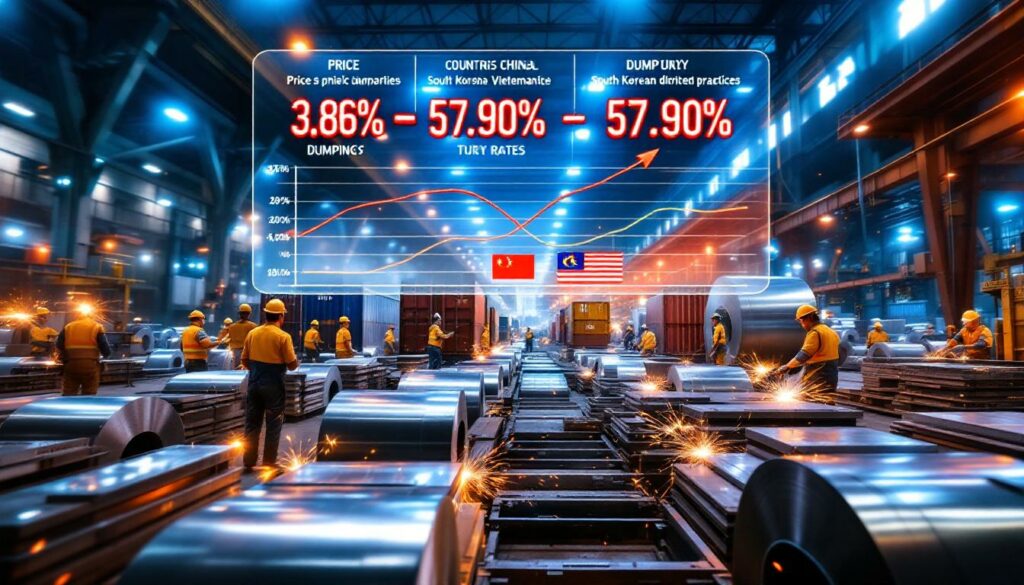What Are Anti-Dumping Duties in International Trade?
Anti-dumping duties are specialized tariffs imposed on foreign imports priced below their fair market value. These measures serve as a defensive trade mechanism designed to protect domestic industries from unfair competition. When foreign producers sell goods in export markets at prices significantly lower than in their home markets or below production costs, governments can respond with these targeted duties.
According to the World Trade Organization (WTO), global anti-dumping duties increased by 15% year-over-year in 2024, reflecting growing protectionist sentiment worldwide. The legal basis for these duties stems from the WTO's Anti-Dumping Agreement (Article VI), which requires evidence of three key elements: a calculable dumping margin, material injury to domestic industry, and a causal link between dumped imports and that injury.
Unlike standard tariffs applied equally to all trading partners, anti-dumping duties:
- Target specific countries and even individual companies found to be dumping
- Vary in rate depending on the calculated "dumping margin"
- Require extensive investigation and evidence before implementation
- Must follow strict WTO-compliant investigative procedures
As noted by WTO Trade Policy Review experts, "Anti-dumping duties recalibrate trade imbalances but risk retaliatory protectionism" – a challenge that continues to shape international trade relations.
Why Has Malaysia Imposed Anti-Dumping Duties on Iron and Steel Imports?
Understanding Malaysia's Trade Protection Decision
Malaysia's Ministry of Investment, Trade and Industry (MITI) announced provisional anti-dumping duties on galvanized iron and steel products from China, South Korea, and Vietnam following an investigation that began on February 6, 2025. According to the official announcement, the government found "sufficient evidence that the importation of the subject goods is being dumped," threatening the viability of domestic steel producers.
The investigation was prompted by troubling trends in Malaysia's steel sector. Steel imports surged by 22% in Q1 2025, while domestic capacity utilization rates dropped to a concerning 65% – well below the 80% threshold considered necessary for sustainable operations in the industry.
The Economic Impact on Malaysia's Steel Industry
MITI emphasized that these duties aim to "prevent irreversible damage to local industry" – a statement reflecting the urgency of the situation. Malaysia's steel industry contributes approximately 5.1% to the country's manufacturing GDP, making it strategically important to the national economy.
The investigation's injury analysis revealed multiple forms of economic harm to domestic producers, including:
- Price suppression preventing Malaysian manufacturers from raising prices despite increasing production costs
- Profit margin erosion reaching critical levels for several major steel companies
- Market share losses to cheaper imports despite stable domestic demand
- Employment reductions in steel-producing regions
This pattern of injury aligns closely with classic dumping scenarios observed in other markets, prompting Malaysia to take protective action to preserve its industrial base.
What Are the Specific Duty Rates and Products Affected?
Duty Rate Structure and Variations
The provisional anti-dumping duties imposed by Malaysia range dramatically from 3.86% to 57.90%, with the highest rates targeting specific Chinese exporters. This substantial variation reflects the differing severity of dumping practices across companies and countries. The duties apply to products classified under HS codes 7210.41 and 7210.49, covering various galvanized steel products.
The rate structure breaks down by country as follows:
| Country | Duty Range | Average Rate |
|---|---|---|
| China | 12.65% – 57.90% | 35.28% |
| South Korea | 3.86% – 19.54% | 11.70% |
| Vietnam | 7.42% – 23.16% | 15.29% |
These rates are broadly comparable to similar EU duties on galvanized steel (12-25% range) implemented in 2024, though Malaysia's upper-range penalties are significantly more severe.
Targeted Products and Classifications
The duties specifically target galvanized iron and steel coils or sheets – essential materials used across multiple industries. These products serve as crucial inputs for:
- Construction (roofing, structural components, HVAC systems)
- Automotive manufacturing (body panels, structural components)
- Infrastructure development (bridges, power transmission towers)
- Consumer appliances (washing machines, refrigerators)
- Agricultural equipment (silos, irrigation systems)
The strategic importance of these materials explains Malaysia's concern about pricing distortions. Galvanized steel's corrosion resistance makes it particularly valuable in Malaysia's tropical climate, where humidity accelerates metal degradation.
How Will These Duties Be Implemented?
Timeline and Enforcement Mechanism
The provisional duties take effect from July 8, 2025, and will remain in place for up to 120 days – a timeframe that aligns precisely with WTO's Article 7.4 guidelines on temporary trade remedies. Malaysia has set November 3, 2025, as the deadline for making a final determination on permanent anti-dumping measures.
Implementation will involve Malaysia's Royal Customs Department requiring importers to place cash deposits or bonds equal to the calculated duty amounts. These funds remain in escrow until final determinations are made, with potential refunds if lower permanent duties are established.
As noted by Malaysian trade lawyer K. Anand, "Provisional measures balance urgency and due process" – providing immediate relief to domestic producers while allowing time for thorough investigation.
Investigation Process and Legal Framework
The investigation follows Malaysia's Anti-Dumping Act of 1993 (amended 2019) and adheres to WTO protocols. Key procedural elements include:
- Questionnaires sent to all known exporters and importers
- On-site verification visits to manufacturing facilities
- Public hearings where interested parties can present evidence
- Technical analysis of dumping margins and injury indicators
- Final determination with published explanatory memorandum
This rigorous process ensures transparency and compliance with international trade law. The final determination requires a WTO-compliant public hearing where affected parties can present counter-evidence and challenge preliminary findings.
What Are the Regional Implications of Malaysia's Decision?
Impact on Asian Steel Trade Dynamics
Malaysia's decision reverberates across Asian steel markets, especially considering that China, South Korea, and Vietnam collectively account for 68% of Malaysia's steel imports. This significant market share means the duties will substantially reshape regional trade flows.
The Institute of Southeast Asian Studies has warned that "ASEAN may fragment into protectionist blocs" if more countries follow Malaysia's example. This concern reflects growing tension between ASEAN's free trade aspirations and national industrial protection priorities.
Regional implications likely include:
- Trade diversion to countries not subject to duties (potentially benefiting Japanese and Indian exporters)
- Pressure on ASEAN's Regional Comprehensive Economic Partnership (RCEP) cohesion
- Intensified price competition in alternative export markets as affected producers seek new customers
- Potential reciprocal measures against Malaysian exports
Potential Responses from Affected Countries
Affected countries have several response options available:
China may challenge the duties through the WTO dispute settlement mechanism, similar to its response to US‑China Trade Tensions. Chinese producers might also accelerate investments in Malaysian production facilities to circumvent the duties entirely.
South Korea has historically been highly proactive in challenging trade restrictions, as evidenced by its 2024 WTO challenge against U.S. steel duties. The Korean government may also provide export support to help producers maintain market share despite the duties.
Vietnam, with its developing steel industry, may be most vulnerable to market exclusion. Vietnamese producers might pursue price adjustments to minimize duty impacts or leverage ASEAN diplomatic channels to negotiate modifications.
"These duties will inevitably trigger strategic recalibrations across Asian steel markets, potentially accelerating regional supply chain restructuring already underway due to geopolitical tensions," notes the ASEAN Steel Council in its recent trade analysis.
How Does This Fit into Global Trade Protection Trends?
Rising Protectionism in Steel Markets Worldwide
Malaysia's action aligns with a global surge in steel sector protectionism. According to the Global Trade Alert database, 1,631 anti-dumping measures were active globally in 2025, with steel products representing nearly 30% of all cases. This disproportionate focus on steel reflects what the OECD Steel Committee describes as "chronic overcapacity" in global production.
Notable recent examples include:
- India's 2025 duties on Chinese alloy steel (20-35%)
- EU's extended safeguard measures on steel imports (15-25%)
- U.S. maintenance of Section 232 tariffs despite trade agreement modifications
- Brazil's anti-dumping duties on Chinese cold-rolled steel (up to 45.9%)
This pattern suggests Malaysia's decision represents not an isolated action but part of a coordinated global response to structural imbalances in steel markets.
Balancing Free Trade and Industry Protection
Malaysia's decision highlights the fundamental tension between free trade principles and domestic industry protection. While Malaysia has generally pursued trade liberalization through ASEAN and other frameworks, this action demonstrates the limits of that commitment when confronted with perceived unfair competition.
The WTO itself acknowledges this balance, noting that anti-dumping measures represent "safety valves" within the international trading system rather than violations of its principles. The key distinction is between legitimate protection against unfair practices versus protectionism aimed at insulating inefficient industries from competition.
For Malaysia specifically, the challenge lies in ensuring these duties address genuine dumping without undermining the broader benefits of international trade that have fueled its economic development. This balancing act represents the central challenge of modern trade policy globally.
What Economic Factors Drove Malaysia's Decision?
Domestic Industry Concerns and Lobbying
The Malaysian Steel Association has been vocal about threats to domestic producers, citing several economic indicators that triggered the investigation:
- Production volume declines: Major Malaysian steel producers reported 15-20% production decreases in 2024 despite steady domestic demand
- Employment impacts: The sector shed approximately 3,800 jobs (7% of its workforce) over 18 months
- Investment freezes: Several planned capacity expansions were suspended, representing approximately RM1.2 billion in delayed investment
Malaysian Industrial Development Finance analysts note that "unpriced imports distort market signals," preventing efficient resource allocation and undermining industrial policy objectives.
Market Data Supporting the Decision
The investigation analyzed extensive price comparison data, revealing significant disparities that suggested dumping:
- Export prices to Malaysia averaged 12-18% below home market prices for the same products
- In some cases, export prices fell below production costs when accounting for raw materials, energy, and labor
- Import volumes increased even as domestic consumption remained stable, indicating market share displacement
- Price undercutting margins widened from 5-7% in 2023 to 15-22% by early 2025
These trends provided the technical basis for calculating dumping margins and establishing the causal link between dumped imports and domestic industry injury required under WTO rules.
How Might This Affect Steel Prices and Supply Chains?
Price Implications for Malaysian Consumers and Industries
The duties will almost certainly increase domestic steel prices, with varying impacts across sectors. The Malaysian Contractors Association estimates construction costs may rise 4-6% due to higher material inputs, potentially affecting housing affordability and infrastructure development timelines.
Other sectors likely to experience significant impacts include:
- Automotive manufacturing: Vehicle production costs may increase by 1.2-2.5% according to industry analysts
- Appliance manufacturing: Frost & Sullivan notes "automakers face material substitution challenges" as they attempt to mitigate cost increases
- Renewable energy: Solar mounting system costs could increase 3-5%, potentially slowing Malaysia's green energy transition
For consumers, these upstream price increases will eventually filter through to end products, though competitive pressures may absorb some of the impact in the short term.
Supply Chain Adjustments and Sourcing Shifts
Malaysian businesses dependent on imported steel are already exploring supply chain adaptations:
- Supplier diversification: Shifting procurement to Japanese, Indian, or domestic sources
- Material substitution: Investigating alternative materials where technically feasible
- Vertical integration: Some larger manufacturers considering direct investments in steel production
- Just-in-time inventory recalibration: Building larger stockpiles to hedge against price volatility
"Companies with the agility to rapidly reconfigure supply chains will gain competitive advantage in this new landscape," explains a recent PwC Malaysia supply chain resilience report. "Those locked into fixed sourcing patterns may face significant margin pressure."
These adjustments may accelerate existing trends toward supply chain regionalization and redundancy, potentially creating more resilient but less cost-efficient industrial networks in Southeast Asia.
FAQ: Malaysia's Anti-Dumping Duties on Steel Imports
What evidence does Malaysia need to make these duties permanent?
To implement permanent anti-dumping duties, Malaysia must conclusively demonstrate three key elements:
- Dumping existence: Evidence that exporters sold products below fair value, typically by comparing export prices to home market prices or production costs
- Material injury: Documented harm to domestic industry through at least 3 years of declining sales, profits, or other key metrics (per WTO precedent)
- Causal link: Proof that dumped imports, rather than other factors, caused the identified injury
The final determination requires comprehensive economic analysis, verified pricing data, and consideration of alternative explanations for industry challenges.
Can affected exporters appeal these duties?
Yes, affected exporters have multiple appeal options:
- During the investigation: Provide counter-evidence through questionnaire responses and participation in verification visits
- Administrative reviews: Request duty recalculation if their pricing practices change
- Judicial review: Challenge procedural aspects in Malaysian courts
- WTO dispute: Their governments can initiate WTO dispute settlement procedures if Malaysia's process violates WTO agreements
According to MITI's procedural guide, "Exporters can appeal via on-site verification" and other mechanisms to ensure their evidence is properly considered.
How do anti-dumping duties differ from regular import tariffs?
| Feature | Anti-Dumping Duties | Regular Tariffs |
|---|---|---|
| Purpose | Remedial (correct unfair trade) | Revenue generation or broad protection |
| Application | Specific countries/companies | All trading partners equally |
| Duration | Limited (typically 5 years with reviews) | Indefinite unless modified |
| Rate basis | Calculated dumping margin | Policy decision |
| Legal framework | WTO Anti-Dumping Agreement | General trade policy |
| Implementation process | Requires investigation and evidence | Administrative decision |
Anti-dumping duties are thus more targeted, temporary, and procedurally complex than standard tariffs.
Will these duties violate any free trade agreements?
No. Anti-dumping duties are specifically permitted under most free trade agreements, including ASEAN agreements and the Regional Comprehensive Economic Partnership (RCEP). These agreements typically incorporate WTO anti-dumping provisions by reference.
The key requirement is procedural compliance – Malaysia must follow proper investigation methods, provide transparency, and allow affected parties to present evidence. The tariffs impact overview shows that the duties themselves, if properly implemented, represent an allowed exception to general tariff reduction commitments rather than a violation.
Further Exploration
For readers interested in deeper understanding of steel market dynamics and trade policy, several resources provide valuable context. The WTO's annual Trade Policy Reviews offer comprehensive analysis of global anti-dumping trends. Industry-specific insights can be found through the ASEAN Iron and Steel Industry Federation and the World Steel Association's market analysis reports.
The OECD Steel Committee also publishes detailed capacity and trade flow data that illuminates the structural challenges driving protectionist measures. Additionally, understanding iron ore price trends and monitoring proposed tariff breaks provide valuable context for evaluating how these duties might affect broader commodity markets. These resources help clarify whether Malaysia's duties represent justified protection against unfair competition or potentially counterproductive market intervention, especially when considering US economy tariffs and their global implications.
For the latest developments in this ongoing situation, readers can follow Reuters' coverage of Malaysia's anti-dumping duties and analysis from Mining.com on international steel trade.
Want to Spot Major Mineral Discoveries Before the Market Does?
Discovery Alert's proprietary Discovery IQ model provides instant notifications on significant ASX mineral discoveries, transforming complex data into actionable investment insights. Explore historic returns of major discoveries and position yourself ahead of the market by visiting the Discovery Alert discoveries page.




